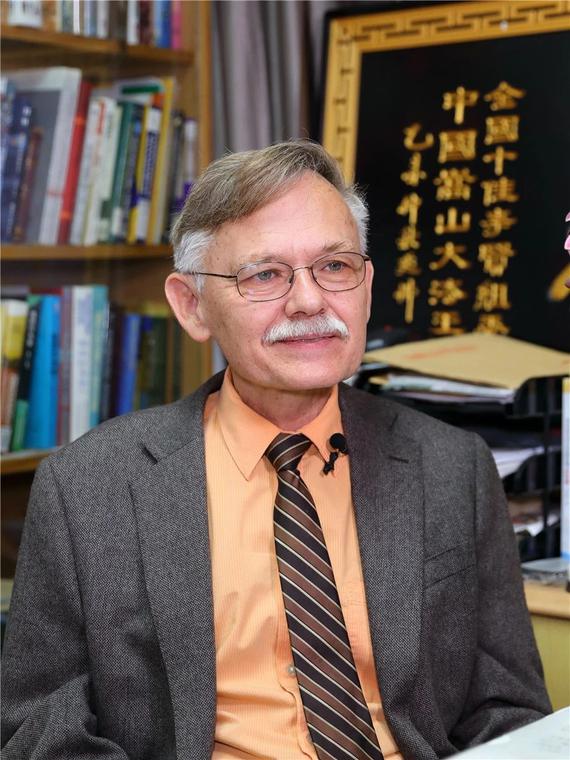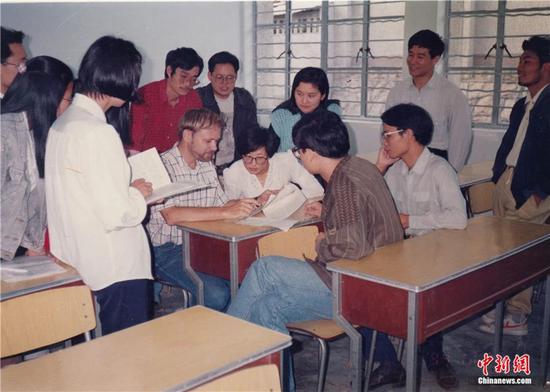(W.E. Talk)Professor William N.Brown: How Should the World Today Better Understand China?
By Yan Xu, Li Siyuan
"Once we open our hearts, we have a tacit understanding after a hug. Once we set aside our prejudices, there is little distance over the Pacific. In your letters home, China is written in your words. Between the lines, your deep emotions can be felt. From afar, you remain ever-present, with sincere love. We all appreciate your friendliness.
This quote, from the "People Who Moved China in 2019" series, answered the question: why did an American connect with China?
William N. Brown, a professor from the United States at Xiamen University, who has been living in China over three decades since 1988. Recently, he was interviewed by China News Service's West-East Talk. In the interview, he shares how he formed his connection with China and discusses how he introduces a more authentic, comprehensive, and vivid picture of China to the world.
Here are the excerpts of the interview:
CNS: Why did you become the first foreigner in Fujian Province to hold a "Foreigner Permanent Residence Identity Card of the People's Republic of China"?
William N.Brown: 缘分!
I sold my business in September 1987 to work full-time on my doctoral dissertation. The next year, I was told that Xiamen University has an Overseas Education College for teaching Chinese as a foreign language, and it will offer housing to foreign students who bring their family with them. My wife and I and our two sons then came to Xiamen.
When XMU asked me to teach business only two months after I started studying Chinese, I declined, several times. Later, I very reluctantly agreed to teach for only one year, until they could find someone else, and then agreed to a second year, but in the third year they no longer needed to persuade me. Based on China's history, I had confidence that China, unlike other big nations the past 500 years, would develop peacefully. I realized that this made business—and MBA studies—very strategic for China.
To prove my optimism about China's development prospects and my commitment to stay in China, I applied 4 times for permanent residence, and became Fujian Province's first foreign permanent resident in 1992.
Today, I'm grateful that Yuanfen led us to this beautiful garden island.
CNS: You have taken a self-driving tour of China in 1990s and 2019. What are the differences between the two experiences?
William N.Brown: Within months of arriving in Xiamen, I began to explore the countryside to better understand rural development and problems. In 1993, for a more comprehensive understanding of China's development, both the coast and the inland areas, I bought a van to explore China with my wife and sons.
Starting from Xiamen University, we have traveled over 10,000 kilometers through Fujian, Guangdong, Hainan, Guangxi, Hunan and Jiangxi, and having survived that. In 1994, we drove 40,000 kilometers in 3 months, from Xiamen to Mongolia in the West to Qinghai and Tibet in the West and back to Xiamen through South and Central China.
It was true that remote areas were indeed poor, but people across China were optimistic because life had never been better for them, and the country was stable and secure. And every place I visited, the people had hope in "Roads first then Riches" (要想富先修路)philosophy. This program provided the infrastructure to help even the remotest peoples seize opportunities.
In 2001, while Fujian governor, Xi Jinping awarded me honorary citizen of Fujian, we talked about how to tell China's story to the world, and he encouraged me to write more books. So in 2019, I sent President Xi Jinping my newest book, "Off the Wall – How We Fell for China", with a thank you letter for encouraging me to write. I was surprised that he'd write me back.
"As an eyewitness to China's reform and opening-up, you have represented Xiamen and Fujian province, and painted a real picture of China for the world. I really appreciate your attitude of integrating into the Chinese community," President Xi said in his letter, "I am also confident that you will see a better and more prosperous China that will bring even more benefits to the world and humanity, and therefore the Chinese stories you tell in the future will be even more wonderful."
To do that, I decided to travel around China again and see the changes from my last trip. My 1994 drive had taken 3 months and 40,000 kilometers, but thanks to new highways, bridges and tunnels in every province, the 2019 trip took only 32 days and 20,000 kilometers—half the distance! I was shocked by the amazing changes in every aspect over the last 25 years. No country in history has ever changed so many lives so quickly.
I was especially moved by the effort China put into improving minorities’ lives. In most countries, minorities suffer many disadvantages, but China had gone to great lengths to improve minorities’ living standards and improve their education so they could take part in governing and improving their areas. And thanks to internet and highways, even Tibetans in remote villages engaged in e-commerce.
CNS: You have become an eyewitness, participant, and witness of China's booming development. How do you introduce a more authentic, comprehensive, and vivid portrayal of China to the world?
William N.Brown: If you understand history, you know that Chinese think long-term and achieve goals no one else would even attempt. But in the beginning I thought it would take 40 or 50 years for big changes, and that we were all "planting trees so future generations could enjoy the shade". We never imagined, just over a decade later, we too would "enjoy the shade".
The world has so much to learn from China, on many fronts. This is why, over the past few decades, I've studied Chinese history and traveled some 200,000 kilometers around China, so I could do my best to tell China's Story through books, articles, lectures, social media and TV programs. I've also seen we need to tell China's Story better to Chinese.
But in telling China's story, to either "老外" or "老内", I've learned through my mistakes a few lessons.
Don't Confront. As soon as I saw that China was nothing like the West pictured it, I wrote letters to family and friends telling them they were wrong about China. This only angered them. So I stopped trying to refute Western misperceptions and instead wrote about the lives of ordinary Chinese people, and I used humor to break the ice. Within 6 months, over 500 people were reading and copying my letters, and even young children wrote to ask me questions about China—especially about how Chinese children lived, studied and played.
Alike but Different(和而不同). Which is a key to telling China's story. Americans and Chinese are both dreamers, they share the same hopes for a better life and a brighter future. So I have focused on telling stories that Americans can understand, even respect and admire. Once Americans see what we have in common with Chinese, they can better accept and even respect our differences, show the world the idea of 和而不同 together.
Personalized China Story. Personalized stories are more credible and persuasive because they are firsthand and unique, and not simply retelling someone else's story. For example, when it comes to the Belt and Road Initiative, they are interested when I share that my youngest son and his wife and 3 kids live in Africa and do volunteer medical work. I also share how my African friends’ lives have changed because of China. One African said they had no hope before China began helping them.
Encourage Sharing. I've tried to convince Chinese, young and old, that it is both their opportunity and responsibility to share their own China Story whenever we can. This is why one of my biggest joys over the past 36 years has been the Stories of China Retold in English. It has been a great honor to be a judge, and also act as the ambassador. I've enjoyed coaching Chinese youth on telling China's story. In addition to this China Stories event, I've also enjoyed helping Prof. Hu Min edit and publish new versions of such Chinese classics as Sunzi Art of War, Laozi's Daodejing, and Confucius’ Analects, and we are now compiling books of stories for every province in China.
CNS: What views and suggestions do you have for China-US relations and people-to-people or educational exchanges between the two sides?
William N.Brown: The relationship between China and the US affects the entire world. the 21st century may be worse if China in the East and the USA in the West can't forge a good relationship—but I have confidence they can. The key is people-to-people relationships—which is why I was happy that in November 2023, China offered to invited 50,000 American students to China within the next 5 years.
For over 30 years, I've encouraged young Americans to take a "Gap Year" in China. I tell them that regardless of career plans, in today's world, a knowledge of both English and Chinese is a great asset. If they love China, they should visit. But if they fear or dislike China—they should visit anyway. But in my personal experience, once you know China, you come to see it is not an enemy but a friend. And for me, the former enemy has become not just friend but also family.
We need more face-to-face, heart-to-heart contacts. I'd like to share a moving story about heart-to-heart relationships.
My wife was my best friend for 40 years until she left this world in Xiamen in 2021. When we had arguments during our early years of marriage, I tended to go silent and not want to discuss the problem—but Sue's approach was different, and subtle. She would let me stew half an hour or so and then come sit close beside me. This too angered me—especially when she'd take my hand and hold it, silently. Eventually, I'd feel ridiculous being angry at her, and we'd talk it out. After a few years of marriage, Sue divulged her strategy: "It's hard to stay angry with someone when you're side-by-side, holding hands."
Her wisdom saved our marriage—and such wisdom will apply in Sino-US relations.
About the interviewee:

William N.Brown, a United States professor at the School of Management at Xiamen University. Prof. Brown moved to Xiamen with his family in 1988 when he started working at Xiamen University, made him one of the first foreign teachers in China's MBA programs. In 1992, he became the first foreigner in Fujian to gain a permanent residence permit in China. He was the winner of the Chinese Government Friendship Award, Fujian Honorary Citizenship, Xiamen Honorary Citizenship. He was listed among the "People Who Moved China in 2019". Prof. Brown has authored nearly 30 books, including Off the Wall – How We Fell for China and Magic Fujian, through which he aims to introduce a more authentic, comprehensive, and vivid portrayal of China to the world.

